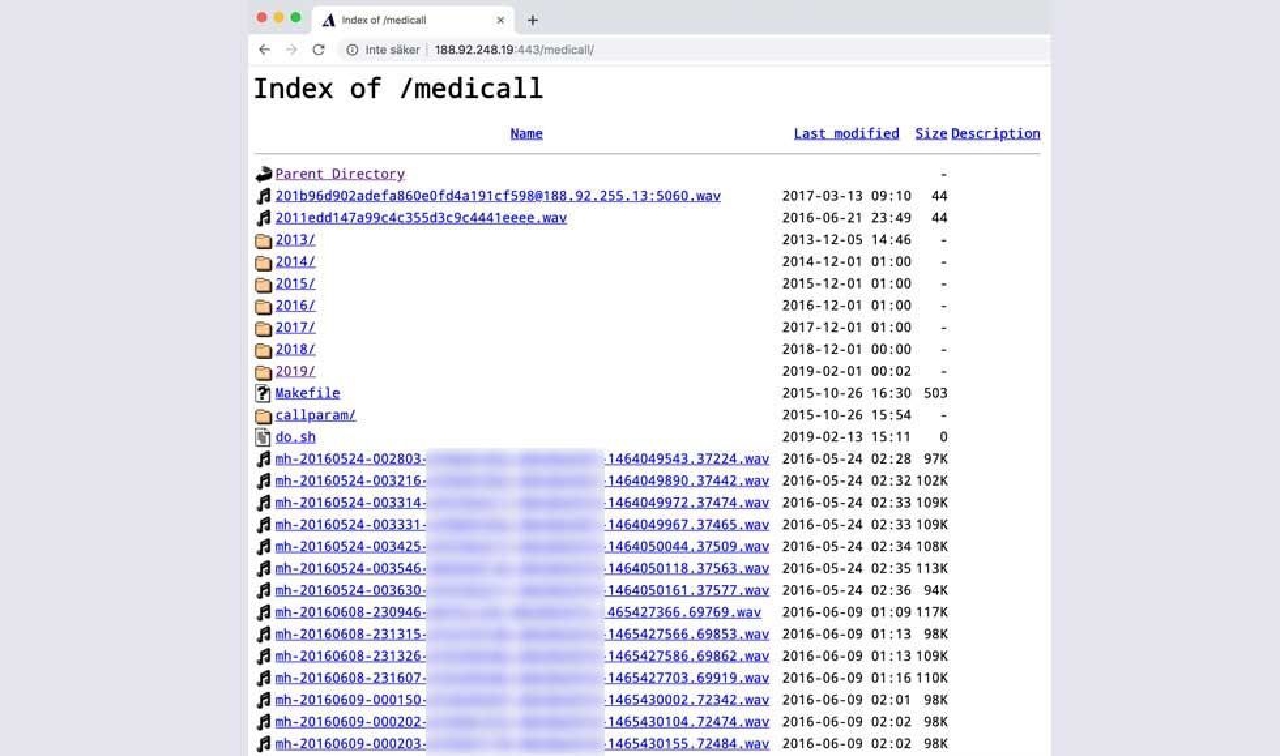It was early 2019, and most Swedes were on their way to work, maybe having coffee, or like me, coding an e-commerce site while enjoying my green monster energy drink. An article published by Computer Sweden revealed that “2.7 million recorded calls to 1177 Vårdguiden were completely unprotected on the internet”. According to Computer Sweden, they discovered 2.7 million recorded voice calls on a publicly accessible server dating back to 2013. These calls were made to 1177, the Swedish health system, and contained sensitive information such as diseases or other ailments that callers sought advice for. The callers discussed the medicine they were using, previous treatments, and in many cases, even revealed their national identification number. All this information was openly stored on the internet, accessible to anyone.
For those who are unfamiliar with 1177, it is a healthcare center owned by the government. Swedish people use it to access services such as viewing journals, booking appointments, or obtaining information about diseases, including Covid-19.
When the TV news started reporting on this and more articles were published, I realized that it was a complete disaster, a chaotic situation. The Swedish health system, known as 1177, had hired Medhelp, a company that handles medical phone calls, to handle the phone calls. Medhelp then subcontracted the work to their partner, Medicall, another company that assists Medhelp in managing phone calls. Medicall is based in Hua Hin, Thailand. According to Computer Sweden, Medhelp utilizes Medicall during “uncomfortable times” or challenging situations.
During this period, Medicall utilized the cloud-based system Biz 2.0 provided by Voice Integration Nordic AB. This company offers a cloud-based phone call system specifically for health centers. Voice Integration Nordic AB utilizes Applion as a hosting service for its phone calls. Applion provides a NAS to Voice Integration Nordic AB, which is in turn used by Biz 2.0 and subsequently used by Medicall.
The NAS can be accessed at the URL http://188.92.248.19:443/medicall/. The NAS is hosted by Appalion AB, a sister company to Voice Integration Nordic AB. It’s important to note that this NAS had direct internet access through an Ethernet cable, without a proper firewall in front. The CEO of Voice Integration Nordic, Tommy Ekström, commented on the network access for the NAS, stating: “someone had inserted an internet cable into the hard drive” source.
Before this article was published, Computer Sweden contacted Medicall’s (which no longer exists) CEO, Davide Nyblom, to inquire about the public availability of these files. Davide denied that the files were publicly accessible. When Computer Sweden requested to share a file with Davide, he abruptly ended the call.
While reading this, you might understand why I think this is another Swedish mess. (There is another mess that can be another article.)

“The command movement” was born
The meme “the command movement” originated in Sweden and has gained popularity among tech enthusiasts. It is often used to describe situations where there is a bug and its cause is not understood, or when someone wants to avoid taking responsibility for a bug. It is also used when production servers are down and the CEO of the company asks what in the flippin burgers is going on. “well, someone made a command movement and now everything is down.”
The term “the command movement” or “Kommandorörelse” in Swedish, was coined by Tommy Ekström, the CEO of Voice Integration Nordic, during an interview with Dagens Nyheter. Ekström claimed that it would be impossible for “normal persons” to access the server, suggesting that only those capable of a special command move could do so. In reality, all one needed was the correct URL to the server.
Incompetence
What I’m really curious about is how this could have happened. How could 1177 or the coordinating company not have asked the following questions:
- How does the system actually work?
- Are there any plans to hire more companies?
- Do you record the calls, and if you do, where is the data stored?
- How exactly is the data stored?
- What level of security is in place?
From what I gather, it seems like inexperienced individuals were brought in to solve a tech-related problem for 1177. This likely led to the wrong questions being asked. There was a lot of trust placed in the hired company, but it seems like not enough questions were raised. Another problem is the lack of accountability and preventive measures right from the start.
Unfortunately, incidents like this are not uncommon and may happen again. Sweden has also had a similar issue with an expensive school platform that ended up publicly sharing grades.
What happen after?
Following the security breach, the Swedish Privacy Protection Authority took swift action and launched an extensive investigation into Voice Integration Nordic. The purpose of this investigation was to shed light on the events that unfolded and determine the root cause of the incident. As a result of their findings, significant fine penalties were imposed on the parties involved.
Medhelp, the company responsible for handling the medical phone calls on behalf of the Swedish government, faced the brunt of the consequences. Initially, they were slapped with a hefty fine of 12 million Swedish kronor. However, after further deliberation, the fine was later reduced to 8.8 million Swedish kronor. This substantial financial penalty serves as a stern reminder of the gravity of the situation and the need for accountability.
Additionally, Voice Integration Nordic AB, the provider of the cloud-based phone call system utilized by Medhelp, was not spared from the repercussions. They were fined 500,000 kr for their involvement in the incident. This penalty underscores the importance of ensuring robust security measures and safeguards when handling sensitive information.
Summary
I am absolutely amazed that these types of things can happen, especially when the buyer is none other than 1177, the Swedish healthcare system. It is truly surprising that people are not able to ask simple questions when purchasing systems. I would have absolutely loved to be in the room when this system was being bought, just to witness firsthand how the ongoing conversation would have unfolded. This story is probably not something new for most Swedish tech personnel reading my blog. But for the worldwide web, this is undoubtedly something that would make you shake your head and think, “What in the flipping burgers are they doing?”
Anyway, I hope you liked this article. If you have any feedback, please reach out to me. The easiest way is via Twitter at https://twitter.com/emil_priver.
